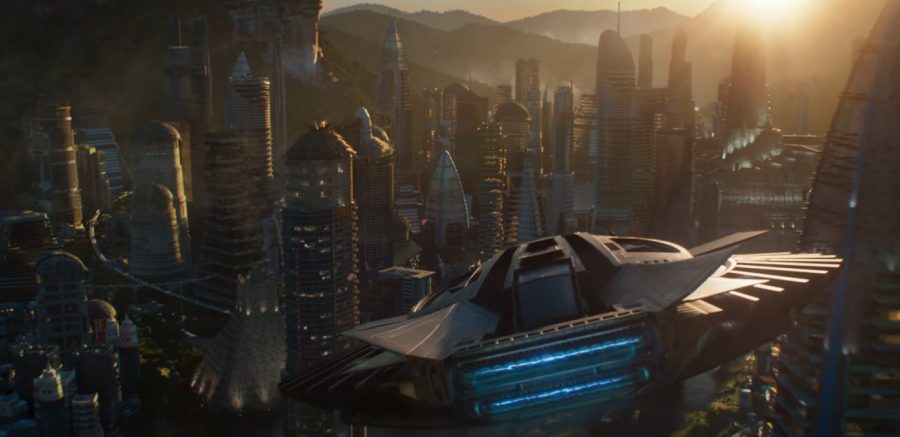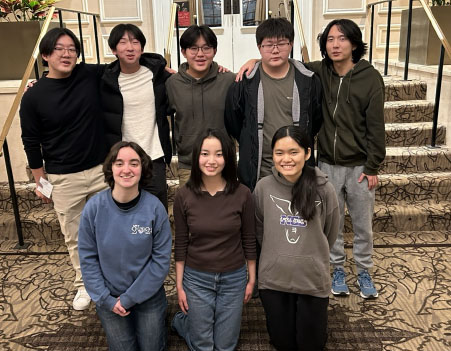Black Panther review: An intricate Afrofuturist masterclass in worldbuilding
The idea that Ryan Coogler’s Black Panther takes place within the much larger Marvel Cinematic Universe is almost incomprehensible.
Black Panther is, first and foremost, a universe on its own. Coogler has gorgeously crafted an immense and intricate kingdom in Wakanda, laying massive groundwork before even beginning to place his story on top. A story which doesn’t really hit any untraditional beats. The movie features T’Challa, king of Wakanda, played by Chadwick Boseman, trying to lead his kingdom after his father’s death. From there, the narrative goes as anyone would expect, traveling down a trail of power struggle, “great king” speeches, and intergenerational conflict. But the familiar nature of the story doesn’t matter because the world around it is nothing any moviegoer has ever seen before, and stunningly so.
Every panning shot of the landscape is gorgeous, featuring a huge network of Afrofuturist architecture, which isn’t just limited to T’Challa’s city (which is an impressive urbanized feat on its own) but extends to the stunning snowy mountain residence of the Jabari tribe and the rhino farms of W’kabi’s (Daniel Kaluuya) Border Tribe.
And these are more than just fancy shots, each visual marvel hits with emotional resonance. Unlike Marvel’s other attempts at worldbuilding (with Asgard in Thor and various cyberpunk planets in Guardians of the Galaxy) Black Panther’s universe is packed with backstory to justify every location. Wakanda’s history of Vibranium production and tribal conflict offers rich explanations for its world, a world Coogler masterfully lays out for the viewer piece by piece.
But don’t mistake this for a self-fellating trip in CGI worldbuilding, like Cameron’s Avatar. Black Panther is eons beyond that. Despite its carefully crafted intricacies, Coogler wastes little time expositing about his new world. Beyond a brief narrated history lesson on Vibranium at the movie’s opening, Coogler allows Wakanda’s vast cultural and political web to speak for itself, with Wakanda’s alternate history weaving its way into Black Panther’s stunning cast of characters. Every last detail is considered: Tribal politics, romance, cultural tradition, ritual, not to mention the language and accents. Perhaps the most impressive details are subtle ones that speak to the intricate care Coogler took in creating his world. Like T’Challa’s younger sister (Shuri, played by Letitia Wright) casually spearheading the forefront of technological advancement, the “X” Wakandans make across their chest, the consistent inflections throughout each individual accents, all combining to compose a precisely crafted nation and culture.
These subtleties are aided in large part by the stellar efforts of Black Panther’s all-star cast. Boseman’s T’Challa is quietly powerful, adding to the mysterious and brooding leader we were introduced to in Civil War. Alongside him are Danai Gurira of Walking Dead fame, playing T’Challa’s general Okoye, and Lupita Nyong’o playing T’Challa’s ex-lover and Wakandan central intelligence operative. Both play off of Boseman brilliantly, as they keep Boseman in check with banter full of history while forcefully driving their respective character’s ideologies. But Boseman’s verbal spars are at their best when alongside Michael B. Jordan’s Killmonger whose fiercely noble plans create the most sympathetic villain since Tom Hiddleston’s Loki. (Bonus mentions for Andy Serkis, who was just awesome as Klaue and Martin Freeman, who’s always a joy to have around.)
Black Panther features a couple of breakout performances as well. In particular, Letitia Wright’s Shuri and Winston Duke’s M’Baku. Shuri is a brand new kind of sidekick: the 16-year-old hi-tech prodigy younger sister of a king. Despite her age, you wouldn’t question her intelligence once. She carries herself with the air of an even snarkier (and frankly, smarter) Tony Stark, making what is probably the most lovable character in the film. Meanwhile, Duke introduces a character that viewers will heavily anticipate more of in the coming Black Panther sequels. Duke plays the Jabari leader with hilarity and complexity giving more than just a crazed bad guy for Boseman to go head-to-head with in future films, but a clever and oddly charismatic leader audiences may even sympathize with.
The cast is more than up to the task of delivering the various sides of the story’s moral crux: whether Wakanda should help the global black community. Black Panther is the first Marvel movie to take such a hard look at social issues and it does so with remarkably perceptive insight for what should have been another big, smelly blockbuster (not wholly surprising considering Coogler’s first feature-length film was Fruitvale Station). T’Challa’s struggle as he considers his moral obligation is not one with an easy answer – is his responsibility to his kingdom or to the world? Coogler only falls short in how he presents Killmonger, whose valid claims about the value of globalism were framed as malicious and ignorant.
Somehow, in the midst of visual spectacle and intricate storylines, Black Panther also manages to have what is easily the best soundtrack of the Marvel Cinematic Universe, composed by Ludwig Goransson. The inspiration Goransson takes from Senegalese and South African music is prominently featured in the percussion and woodwind instruments. Goransson manages to interweave those cultural themes with more familiar 808s and synths as well as the grand orchestral themes befitting of Coogler’s immense empire.
To even call Black Panther a superhero movie feels wholly inaccurate. Black Panther is not what the superhero genre was searching for, it’s what George Lucas was searching for in his prequels: a masterclass in worldbuilding, capable of balancing an intricate larger world with a compelling cast in a way that hasn’t been done since Lord of the Rings. Black Panther deserves more than best movie of the Marvel Cinematic Universe, or even best superhero movie (of which it is both). It deserves its own franchise with spin-offs, tie-ins, and TV shows. It deserves an empire entirely of its own.

